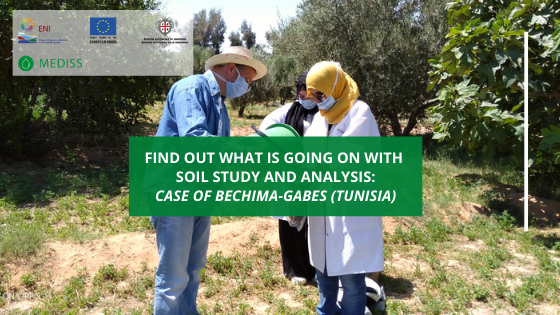[MEDISS] Découvrez ce qui se passe avec l'étude et l'analyse des sols : étude de cas de Bechima-Gabes (Tunisie)

Ce contenu est disponible uniquement en anglais
Treated wastewater used in irrigation could have many advantages, not only in aspects of soil quality (organic content enrichment), but also in social terms, as it allows the preservation of irrigated agriculture activities in regions where groundwater is naturally salty or affected by salinization processes (seawater intrusion and rock water interactions).
In Tunisia, treated municipal wastewater seems to be an alternative water resource for forage crops irrigation with an improvement of their chemical quality. However, the study of wastewater quality and soil types appear to be necessary for assessing the impact of the treated wastewater reuse in irrigation on soil composition evolution, because changes in microbiological community in soil are also considerably influenced by soil type and some agricultural practices.
To assess the chronic soil contamination and the cumulative wastewater impact, the MEDISS Tunisian partner, Institut des Régions Arides de Médenine (IRA Médenine), has to do soil analysis of MEDISS pilot area located in Bechima-Gabes region, which has been irrigated for fifteen years with treated wastewater (secondary effluent).
Since its inception, no analysis of soils composition (irrigated with treated wastewater) has been published. Accordingly our work is to take soil samples from different areas located in MEDISS pilot area, during wet and dry seasons and at different soil depths to subsequently perform analyses of the different physicochemical and microbiological parameters. Four plots were chosen:
- P1: Plot not irrigated by wastewater;
- P2: Plot irrigated by wastewater for one year;
- P3: Plot irrigated by wastewater for 7 years;
- P4: Plot irrigated by wastewater for 15 years.
In these different plots, IRA sampled at 3 different soil depths, 0-20 cm, 20-40 cm and 40-60 cm. By this work, IRA will be able to characterize soil compositions and even predict their chemical and microbiological signature evolution. This study will also allow IRA researchers to study pollutants migration from surface soil layers to the shallow aquifer. A field study and a comparison with other sites seem to be necessary.

Surveys should also be conducted to accurately determine the influence of changes in the physiochemical and microbiological composition of the soil, particularly in terms of fertility, crop productivity and human health in the context of sustainable development.
MEDISS in Tunisia
The “Mediterranean Integrated System for Water Supply” MEDISS project addresses the issue of improving the quality of saline groundwater present in the MED area opening up alternative irrigation for higher quality and more diversified cultivations.
According to the features and specific needs of the partner areas, MEDISS will test innovative solutions in the use of treated wastewater and desalination of brackish water.
In Tunisia, MEDISS evaluates the impact of treated wastewater irrigation on soils, develops existing pilot plant (8 ha) for tertiary treatment through infiltration percolation, and tests an innovative filter bed of clay and sand in an experimental study.








